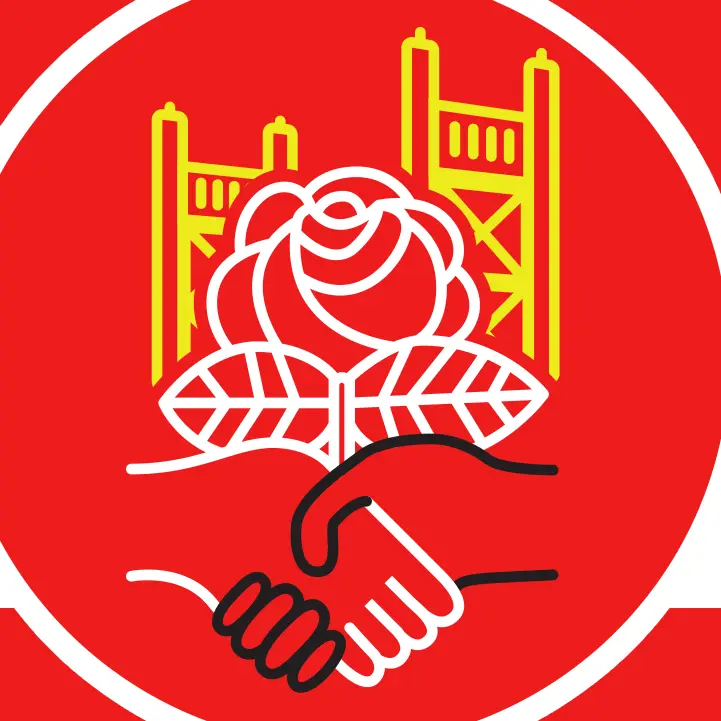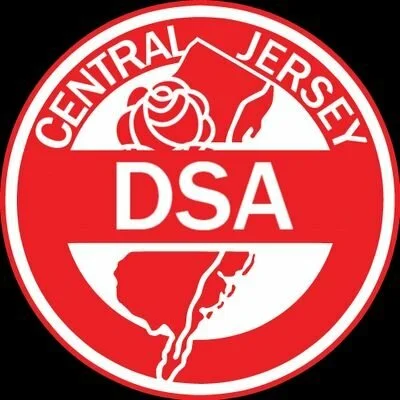

Come See What We're Up To At Mutual Aid!


It's been quite a few months since we last updated everyone on the work we're doing here at Syracuse DSA - Mutual Aid Committee! We've been quite busy with several different projects, so here’s a look into just what's been going on, what’s on the horizon, and how you can get involved!
Sonny's Free Store

We've now successfully hosted our free store (lovingly named in honor of founding member and former chair, Sonny Fantacone) at several local events. At its core, a free store demonstrates the basics of what we as democratic socialists believe people and communities can do to provide for one another. If we are more willing to give of ourselves and our excess to our fellow humans instead of to landfills, then our society as a whole will prosper. To that end, we accept donations of food, clothing, and other goods and, when we have enough and the opportunity presents itself, we set up a "Free Store"!
At our past free stores, we've primarily offered clothing, but at our recent CNY Pride Free Store, we noticed that the few books we brought flew off the shelves immediately! In order to better respond to this apparent community need, we sourced more reading material for our booth at the Westcott Cultural Street Fair. With the assistance of our newest co-chair, Amelia, we've also been able to work in tandem with Onondaga Food Rescue Network through the Syracuse-Onondaga Food Systems Alliance (SOFSA), which allowed us to introduce both non-perishable items and fresh, local produce to our offerings. We got a lot of questions about where our storefront was located during the Westcott Street Fair, so our members are now looking into the possibility of doing pop-up store fronts all across the city, in the hopes of making our free stores more accessible to those in need.
Additionally, we will be fundraising at this year's Plowshares event for both future iterations of Sonny's Free Store, as well as for another project we have on deck for next year, thanks to some help from Philly DSA and a couple of enterprising scientists in California (more to come on this project later!).
If you'd like more information about our future projects, want to donate funds (and maybe buy some DSA swag?), or would like to come check out some of the amazing artists and activists from the surrounding area, come visit us at Plowshares!
And if you're interested in donating to our free store, have questions about when/where our next one will be, would like to have us at your event, or anything else about working with Syracuse DSA Mutual Aid, please feel free to contact us at: syrdsa.mutualaid@gmail.com
Mutual Aid Bags

Something else we've been working on over the past several months are our first round of Mutual Aid (MA) Bags. MA bags are reusable grocery bags that we fill with things like bottled water, single serving cereals, non-perishable snacks, first aid supplies, feminine & general hygiene products , combs for hair, and other staple items. We also try to include at least one "non-essential" in each bag as well—things like re-usable water bottles, sunglasses, perfume, tea, and coffee. For our first round, we successfully collected enough materials to create 22 MA bags and determined that the best way to distribute these bags would be for members to store a handful in their cars, handing them out as they come across folks in need.
We're looking to expand this project by working with other local organizations doing similar community outreach, thereby enabling us to create further rounds of MA bags that fit the specific needs of diverse groups of Syracuse residents. At the same time, we're hoping to pull together enough donations to do a round of bags to provide "Thanksgiving Dinner"-style MA bags to around a dozen needy families, as well as a possible pop-up store front for families or individuals that may be struggling during the holiday season.
If you would like to donate non-perishable items for traditional holiday dinners, inexpensive toys, children's books, inexpensive gifts for adults, or any other items that might go into these holiday MA bags/free store, please contact us at: syrdsa.mutualaid@gmail.com
Check out a comprehensive list of items we're looking for at the bottom of this post!
Care, Not Cops

In the wake of multiple deadly police encounters in Syracuse this past year, our chapter decided that we need a space within our local organization to organize around issues of policing and police accountability. We firmly believe that most emergency calls do not require an armed police response, and we should instead pursue non-violent alternatives for addressing things like mental health crises or domestic disturbances. We also need to better hold cops accountable for their misdeeds, and doing that starts with engaging the community in dialogue to determine how we can build these better alternatives to police response, together.
We focused on the idea that “we keep us safe” and came up with the name Care Not Cops. The goal is to create resource lists of individuals, organizations, and programs that a person in crisis can call for assistance in place of calling the cops.
As many of us know, having several officers respond with guns drawn often escalates many of these already tense situations, often leading to tragic consequences. In the past year alone, there have been multiple instances of officer-involved shootings, all of which must be investigated by the Attorney General's office as per a law that was established on April 1st, 2021. At the time, advocates argued that this would improve police accountability. However, since its inception, the law has often served as a stall tactic rather than as a legitimate means of holding out of control officers truly accountable for overstepping the bounds of their legal responsibilities. Over the past 6 months alone there have been at least two notable cases where body-worn camera footage was either withheld from the public (even after internal investigations were concluded) or cameras were never activated prior to (or during) the incident. Shockingly, investigations carried out by the AG's office found no wrongdoing in either case.
Unavailable camera footage is just one of the worrisome details in these cases and going into all of the gritty details would require a long update in and of itself. For now, we'll say that due to Syracuse's history of policing, as well as its history of racial & social inequity, many of our members feel it is necessary to begin working on expanding the space for abolitionist organizing, starting with promoting better alternatives to call during an emergency than cops.
To that end, we have an available resource called the 911 Alternative Sheet that we are always updating and expanding. If you have any suggestions for resources that you think should be listed, please reach out to us at: syrdsa.mutualaid@gmail.com

Items needed for Holiday Mutual Aid bags/Pop-up Store Front
- Inexpensive children's toys
- Children's books/coloring books
- Crayons, markers, colored pencils, watercolor paints and brushes
- Inexpensive gifts for adults
- Hats, gloves, mittens, scarves, socks, balaclavas, etc. for kids and adults
- Small blankets
- Small craft kits
- Craft paper, construction paper, plain writing paper, etc.
- Tape, glue sticks, white glue
- Yarns, threads, crochet hooks, knitting needles and other common crafting items that can be used by folks to make their own holiday gifts.
- Common holiday decorations
- Holiday greeting cards & envelopes
- Stamps for mailing cards
- Non-perishable items for holiday dinners
- Stuffing mix
- Canned vegetables
- Quick bread/Cake mix
- Gravy mix
- Canned berries/other canned fruit
- Instant mashed potatoes
- Powdered milk

Ceasefire Now! Socialists Organizing to End the Occupation and Free Palestine
Regular listeners of Revolutions per Minute will be familiar with our coverage of Palestine solidarity work within the Democratic Socialists of America. We recognize that the struggle for Palestinian liberation and the violence of settler colonial displacement are both ongoing. Tonight, our coverage continues with a live conversation with Sumaya and Daphna, two NYC-DSA members and organizers with deep experience in Palestine solidarity work.
We discuss this month’s outbreak of violence in Palestine and Israel, which has led to the genocidal and illegal bombardment of Gaza happening as we speak. Socialists in New York and across the country have joined forces with the multi-cultural, international movement for Palestine solidarity, with hundreds of thousands flooding the streets of major cities, conducting civil disobedience, and calling on the country’s leadership to end United States support for Israel and a ceasefire now. Join us to learn more about why Palestine liberation is a priority for socialists.
Visit https://socialists.nyc/no-money-for-massacres/ to find an upcoming NYC-DSA-endorsed solidarity phone bank or action. Visit gazaispalestine.com to find or post an upcoming protest in your city anywhere in the United States.

Building a Socialist Labor Movement



Every day, billions of working people on Earth toil to maintain a capitalist economy they never asked for. While technological advances and general prosperity have spread beyond the borders of the most advanced countries, the “golden age” of capitalism is over. For the majority of people on the planet, including in the United States, life is getting harder. Capitalism is working overtime to preserve the power and profits of the wealthy at the expense of the rest of us.
In light of this, DSA’s goal is to fight for all working people’s ability to democratically control their own lives in all areas of society and the economy. To achieve that goal, we need two things: the involvement of millions to make a mass movement, and the leverage to win back power from the capitalist class. The only way DSA is going to get what we need to win is by organizing as workers and uniting with organized labor, so we can attack the source of capitalists’ power: their profits.
Labor unions represent the only organized force with the capacity and the leverage to win against capitalists outright. Millions of union members run a collective, dues-funded project to organize and fight for a better life for all working people. So this year, Atlanta DSA has prioritized building relationships with labor unions, educating our members and the public on the centrality of workplace organizing and the importance of determining our own path, independent of big-money donors and politicians.

Most excitingly, with the United States having just experienced its third “Hot Labor Summer” in a row, our chapter has prioritized strike support. Following our solidarity work last year with workers at Nabisco, John Deere, and Starbucks, this summer Atlanta DSA democratically voted to prioritize supporting UPS Teamsters fighting to win higher wages and respect on the job in the largest private-sector contract this country has seen in decades. Atlanta DSA worked for months, in coordination with the DSA National Labor Commission, to show up for the UPS Teamsters. The Teamsters we supported organized to build strong shop-floor support for the contract fight, while the whole of our chapter has met with rank-and-file leaders to learn how we can best provide key support. We hosted educational panels, talked with and interviewed rank-and-file Teamsters, showed up to practice pickets, and canvassed to build community support for the contract fight. In the end, 86% of voting Teamsters approved the new contract, which included raises, air conditioning in trucks, and an end to two-tier jobs.This was only won through a concerted strike campaign that scared UPS into concessions to avoid responsibility for a costly strike.

Our strike solidarity campaign provided an avenue for friends of labor from all across the Atlanta metro area to become involved, and we organized supporters across the community to understand the stakes of this fight. In a word, we’ve helped begin rebuilding the connections between labor unions and the communities they fight for in Atlanta. Now, with UAW Big 3 workers on strike across the country, we are also mobilizing to join workers picketing at the Chrysler parts distribution center in Morrow, GA.

As our members gained experience and our organization gained credibility for the material solidarity we showed to Teamsters, Atlanta DSA’s Labor Committee has worked hard to build positive relationships with other unions, both rank-and-file member-leaders and staff alike. While many unions are still struggling under the weight of repressive governments and hostile corporate management, it becomes a common refrain that “we need to organize our own members before we can devote resources to other groups”. However, as socialists know, an injury to one is an injury to all. A strong labor movement is one that moves together, in solidarity with workers everywhere, because it makes us stronger in the long run. Capitalists love to divide and conquer, so when we can pull a variety of groups together to go to bat for the Teamsters, Starbucks Workers United, United Campus Workers, and the railroad unions, we can show we are stronger than them.
As we’ve helped lay the groundwork for stronger community-labor connections, and a more coherent labor movement, Atlanta DSA is also providing support for workers looking for help organizing at work, even before they are ready to approach a union. We plan to encourage more of our members to volunteer and receive training with the Emergency Workers Organizing Committee (EWOC) (a joint effort between DSA’s National Labor Commission and United Electrical Workers) and use those skills to support new organizing drives across Georgia, including food and retail service workers.
We also support our own members and allies through a monthly Workplace Organizing Roundtable. By providing a space for groups of workers from different industries to come together and talk shop, Atlanta DSA has deepened our institutional knowledge of the organizing terrains in various sectors of the economy. Education, tech, food service, manufacturing, and logistics workers share ideas and learn together, forming a nucleus of organizing knowledge so we can transform the struggle for workplace dignity and democracy.
Through these roundtables, members have been able to discuss methods and techniques for organizing, the history of different kinds of labor struggles, and our plans for organizing in our respective industries. In the coming months, we will expand and deepen our efforts so we can bring in even more people from around the Atlanta area and fight to create a powerful, democratic labor movement.
Just this last month, Atlanta DSA led and organized a labor contingent to the Atlanta Pride Parade, alongside the Atlanta-North Georgia Labor Council, Starbucks Workers United, United Campus Workers, the Teamsters LGTBQ Caucus, Unite Here, AFA-CWA, IAM, and more organizations. As workers in the South, who are subject to a right-wing and repressive state government, it’s important to not just build democratic and militant unions, but also progressive unions, willing to champion racial justice, trans rights, bodily autonomy, and more!

Atlanta DSA’s labor work this year has laid a lot of groundwork that we can use to strengthen the organization of working people into a working class, capable of fighting for itself. We’ve brought together groups that haven’t worked together in the past, beginning to heal the divides wrought by decades of neoliberal attacks on working people. DSA members have advocated for a more militant, democratic, and progressive labor movement in the Atlanta area – one that allows us all to fight for political and economic power, free from the influence of big money institutions that don’t have our best interests at heart. Through our work, Atlanta DSA is helping to once more cohere a working class movement that can fight for all of us. It’s exciting to be a part of, and you should be a part of it, too.
So what’s next? Get involved in our labor work by joining a weekly meeting, checking out a monthly workplace roundtable, get organized with Emergency Workplace Organizing Committee (EWOC), and learn more about what we do!
The post Building a Socialist Labor Movement appeared first on Red Clay Comrade.


Palestine Will Be Free
San Antonio DSA stands in solidarity with Palestine’s decades-long struggle against Israeli occupation. We mourn all innocent lives lost since October 7th, and recognize that the root cause is Israel’s colonial system of apartheid and its systemic violence against the Palestinian people.
Zionism has systematically killed tens of thousands, displaced hundreds of thousands, and subjugated millions. Now, Israel is committing a genocide against Palestinians in Gaza. Thousands of Gazans have already been killed via an indiscriminate bombing campaign; food, water, electricity, and medicine have been blockaded, and a full ground invasion is looming.
Throughout all of this, the US has played a crucial role in backing Israel militarily and diplomatically. We demand an immediate end to Israel’s military assault against Gaza, and to all US military and economic aid to Israel. We also call for an end to the occupation as a whole. We support Palestinian resistance against blockades, ethnic cleansing, apartheid, and genocide.
We call on all San Antonians to stand up for Palestine, and to follow the leadership of local Palestinians, in particular San Antonians for Justice in Palestine (SAJP). We must expose the ignorance and hypocrisy of local politicians who “stand with Israel” but are silent on settlements, ethnic cleansing, and apartheid.
Together we can challenge the local connections to Israeli oppression and open up a front for Palestinian liberation.
From the river to the sea, Palestine will be free.


Procedural Overhead: On An Upcoming Debate at Sacramento DSA Local Convention 2023
For reference, see the 2023 SacDSA Local Convention packet - https://docs.google.com/document/d/1DWZuXSlkLUfKhENPAq6e9DwhCfBt2w__JJxkl2seF1E/edit?usp=sharing
By Benjamin Arriaga
My friend and comrade Jimbo Jackson, and fellow Socialist Majority caucus affiliate, submitted three proposed bylaw amendments for the upcoming local convention. Although my comrade and I affiliate with the same national caucus in DSA, I write this to share my disagreement with his proposals for our local chapter. However, I do make an exception of what I would like to see amended at least in his third bylaw amendment, as detailed below. In the interest of transparency: at this time, we are both expected to step in as Convention Chair and Convention Parliamentarian. I have taken steps to enlist other comrades and receive assurances from them that they will accept these roles when his proposals and my proposals reach the floor. I spoke directly with Comrade Jackson about my position on his proposals and that I would be submitting my position statement for publication with a copy provided to him before its online publication. This autumn season I also began my first annual term as a State Council Delegate to California DSA for our chapter. (FYI: We are allotted four delegates and our chapter has yet to hold an election for the fourth seat.)
First, a word about our process: According to our chapter bylaws, our chapter’s membership is required to hold a local convention annually. Despite the fact that we technically have the ability per these same bylaws to amend the bylaws at any of our general membership meetings, I think that specifically holding an annual local convention encourages us to highlight for this type of meeting a chance to address long-term timescale questions. In comparison with a labor union federation it can serve the same function as a “leadership summit” or in a capitalist enterprise, the “company retreat.” In other words, this type of meeting is intended for asking questions about our structure, our capacity, our strategy, and ultimately for affirming our vision as a democratic socialist organization.
On Comrade Jackson’s Bylaw Amendment #1: Pertaining to CA-DSA delegate role, I urge to vote Nay. I plan to vote Nay due to my observation that this would confine the imagination necessary for nonsectarian representative democracy as a principle in our organization. Allowing for our elected delegates (myself included) to exercise initiative, to communicate well with others, or to find ways to collaborate is naturally an extension of the basic practice of representative democracy. We elect a person to do things. If we don’t like what they are doing, then we let them know, and if they don’t compromise, then we choose someone else by majority rule. Additionally, the original language would also confine the expression of dissenting opinions and the “pledge not to act unilaterally” is so broad as that it might discourage our delegation from adding to the discussion or the work of building the very new California DSA State Council without seeking endless, additional approval. Effective, nonsectarian, representative democracy does not require stipulated language of this type.
By contrast, I urge to vote Yay on the California DSA Delegate Term Activity Resolution I authored and submitted. I agree with Comrade Jackson that California DSA would indeed benefit from collaboration but I argue that this does not need to be stipulated through a bylaw amendment. Instead, my resolution would prompt myself and my fellow State Council Delegates from our chapter to use our heads and take lead on action items to help create a political program for our communities and lead by example at California DSA State Council.
On Comrade Jackson’s Bylaw Amendment #2: Pertaining to political priorities of the local chapter, I also urge to vote Nay. Although one or more of the concerns motivating this amendment are valid, such as “a need to improve communication and coordination as a chapter,” I do not think restricting ourselves through our bylaws to a specific number of priorities would actually improve our chapter’s operations. We cannot legislate or formally deliberate a shortcut around the work of organizing.
The question of our priorities is an organizing question, just as much as it is also a political one that faces every member regardless of holding an official leadership role. It requires setting aside ample time to meet and discuss and develop plans with other comrades to choose what we shall focus on achieving and by when. To assist with that effort, which involves political education, I submitted the Standard Spoken Introductions Resolution to emphasize a new general practice. We may call this a form of popular discipline, perhaps, for our members to take up if they agree with me about its necessity. I think when we practice saying a consistent hard brief pitch of what democratic socialism means, popularizing that kind of message discipline internally can take us on a path to resolve ourselves to be consistent in our messaging overall and the criteria by which we adopt future priorities that can matter to our communities.
Finally, regarding Comrade Jackson’s Bylaw Amendment #3: Pertaining to clarifying committee operations and the organizer role, I urge that someone move to amend its original language when it is on the floor. My recommendation may be best laid out in the following points: • Strike out all language that raises the needed participation threshold to 5 dues-paying members to form a committee and keep our status quo requirement of 3. • Strike out all proposed changes to the Committee Operations subsection of our bylaws. • Accept the proposed change to the Organizer subsection that strikes out the stanza with the “ultimate responsibility” and “liaison” clauses. • Accept the proposed addition of a Committee Membership subsection (while changing to 3 signatories instead of 5 signatories). • Insert after the sentence starting with “Only SacDSA members in good standing” and ending with “committee members,” the following language: • “Committee meeting attendees who are not SacDSA members may call themselves fellow-travelers so long as a member or members in good standing sponsors or takes lead in helping them learn about DSA and assume(s) a responsibility to the chapter for their fellow-traveler’s actions when participating in public-facing political activity.”
At any future general membership meeting, we can make two motions: any dues-paying member could move to introduce a bylaw amendment to expand our Steering Committee to include our Committee Chairs; any dues-paying member can also move to dismantle a committee that the majority agrees with dismantling, howsoever it may be justified during any debate if and only after someone seconds that motion.
I grant that Comrade Jackson is well-intended with his proposals. This does not change my worry that his proposals seem like attempts to reshape our structure to more strictly mimic a democratic centralist model. Democratic centralism, in simple terms, involves a periphery that reports to a center and a center that is elected from a periphery, etc., but that tends to fix and concentrate authority at the center once questions of debate are considered settled. This model has gained a nostalgic following in some groupings outside of DSA but also within whole national caucuses in DSA. Their various attempts to transform our organization, especially now, may exacerbate current trends of “procedural overhead” or “second-job professionalism.” These can burn people out. Nonetheless, the renewed appeal of democratic centralism across different caucuses and chapters in DSA may be a result of real frustration with where DSA is at now. The actual problem of internal organizing deserves its own theorization as well as the construction of an alternative for this historic moment.
The need for this theorization demands collaboration with other comrades to continue this conversation with Sacramento DSA in mind as our material, organizational anchor.

Working Together to Repeal 'Right to Work' Law in Arizona
Tonight, we’re traveling to Arizona to learn from socialist organizers who are fighting on their home turf to make forming and maintaining strong unions easier for workers. We’re joined live by Bobby and Kaland of Arizona Works Together and Phoenix DSA to hear about their campaign to repeal so-called “Right to Work” laws in their state and what it means for union organizers in Arizona and nationwide. Plus, it’s ladies’ night once again here on RPM with Amy and Lee as hosts, so we’ll spend some time discussing why unions are great for women and feminists.
More info at: https://www.azworkstogether.com/
and in Spanish at https://aztrabajajuntos.com/


Grillidarity!
Join us this Sunday, October 29 3pm at the Labor Temple for some grilling, chilling, and organizing! We will be discussing how to mobilize and organize, and what’s the difference. Afterwards we will be grilling, and have some good ole Socialist Socialization! Workshop starts at 3 and cookout afterwards.
Grillidarity art is by local artist Gavin Herzog.


Border country: migrant solidarity in New York City
Revolutions Per Minute explores migrant solidarity efforts in Brooklyn, exploring the broader context of the global migration crisis as Israel continues its military offensive against Gaza. RPM interviews people who have recently arrived in New York from Mauritania, and we meet Jaz Walker from Assemblymember Emily Gallagher's office.


Act Now To Save Stop Ethnic Cleansing and Possible Genocide

As Twin Ports DSA endorsed City Councilor Azrin Awal noted in her statement on October 16, Duluth is about the same length as the Gaza Strip. But Gaza has a population of 2 million people, compared to our 85,000. Israel has already dropped over 6000 bombs on Gaza during the past week, and an invasion is in the works. DSA has launched a No Money For Massacres phone bank campaign. Sign up to participate here.
Below is Councilor Awal’s statement in full.


From the River to the Sea!
After the events of October 7th, 2023, the Israeli occupying force wasted little time in launching an indiscriminate bombing campaign against the 2.1 million Palestinian civilians in Gaza as a collective punishment, targeting ambulances1, apartments, schools, mosques, hospitals, and media outlets, turning the existing blockade into an active and deadly siege. Israel has cut off all water, power, fuel, and food supply to Gaza, a further crime against humanity, and the specter of starvation and genocide looms. Telegraphing further escalation, Israeli defense minister Yoav Gallant ordered a complete siege on the Gaza Strip2; only a day earlier, Israeli Prime Minister Benjamin Netanyahu warned Palestinian civilians in Gaza to “leave now.”3 Leave to go where exactly?
At the time of this writing, thousands of people have already been killed inside and near the Gaza Strip. International law is clear on the legitimacy of occupied peoples to liberate themselves from “colonial domination, apartheid, and foreign occupation by all available means, including armed struggle.”4 International law is also clear on the prohibition of punishing a civilian for an offense he or she has not personally committed and the prohibition of reprisals against protected persons and their property.5 But since the beginning of 2023, the Israeli police, military, and armed settlers have killed, on average, one Palestinian a day. Since Israel imposed the blockade on the Gaza Strip, the occupying force has bombed Gaza a total of seven times: 2008, 2012, 2014, 2018, 2021, 2022, and 2023 — and Palestinians have never been able to leave for safety.
However, Netanyahu’s faux-humanitarian warning to Palestinians, “leave now,” touches the roots of the “Israeli-Palestinian conflict.” In 1948, Zionist paramilitary groups ethnically cleansed over 750,000 Palestinians from historic Palestine and established the state of Israel, a historic event known as al-Nakba in Palestinian collective memory6. It is the reason why nearly 67% of Palestinians in Gaza are descendants of families that were ethnically cleansed from the villages where Israeli kibbutzim and cities stand today. It is the reason why Israel is a military garrison state that maintains an apartheid system today, where Palestinians are harassed, robbed, and murdered by Israeli soldiers and settlers every day, from the Jordan River to the Mediterranean Sea.7 It is the reason why, despite Zionist attempts to deny their existence, Palestinians have continued to resist, persevere, and yearn for Return.
Now is not the time for supposedly balanced, measured statements that obfuscate the truth of the conflict. The failure of international bodies and leaders to hold Israel accountable to international law and to apply UN Resolution 194, the right of Palestinians to return to their ancestral homes, has resulted in what we are now bearing witness to. This has been the status quo for Palestinians for 75 years, and it must end.
Israel is able to maintain this barbaric status quo because of the diplomatic, military, and financial support of the United States since 1967. The United States uses this alliance to project its military power into the Middle East, as it seeks to do in all geostrategically important areas of the globe.
As American socialists, we understand the fight for socialism is international, and we understand the unique role the United States plays in administering a global capitalist empire. To assist Palestinians in their struggle for self-determination, our primary role is to pressure the US for a change in its foreign policy. To this end, we unequivocally support the BDS movement and call on American civil society to join the targeted boycott of Israeli goods, companies, and institutions.
The response of the Biden administration to these events still unfolding has been to supply Israel with more money and weapons.8 9The United States must end its policy of arming the apartheid, settler-colonial ethnostate of Israel. We fully condemn the capitalist Republican and Democratic parties, who are largely culpable for the continuation of violence and dispossession perpetrated upon Palestinians. America’s expanding military-industrial complex continues to act as a force of destabilization and oppression throughout the world, and major arms and military technology manufacturers like Raytheon make billions of dollars in profits from exploitation and war.
As socialists living in the heart of a global capitalist empire, we stand in opposition to the imperialism of the American ruling class, and we stand in solidarity with all oppressed people.
Palestine will be free — from the river to the sea.
In solidarity,
Central New Jersey DSA
-
https://www.businessinsider.com/doctors-without-borders-hospitals-ambulances-targets-israel-hamas-gaza-2023-10
 ︎
︎
- https://www.aljazeera.com/program/newsfeed/2023/10/9/israeli-defence-minister-orders-complete-siege-on-gaza
 ︎
︎
-
https://gulfnews.com/world/mena/israel-palestine-conflict-more-than-530-killed-after-hamas-launched-unprecedented-attack-on-israel-netanyahu-retaliates-declares-war-1.1696670798153
 ︎
︎
-
https://www.un.org/unispal/document/auto-insert-184195/
 ︎
︎
-
https://ihl-databases.icrc.org/en/ihl-treaties/gciv-1949/article-33
 ︎
︎
-
https://www.simonandschuster.com/books/The-Ethnic-Cleansing-of-Palestine/Ilan-Pappe/9781851685554
 ︎
︎
-
https://jacobin.com/2023/10/west-bank-apartheid-israel-idf-oslo-accords
 ︎
︎
-
https://themessenger.com/politics/biden-administration-discussing-military-aid-package-to-israel-after-hamas-attack
 ︎
︎
-
https://www.bbc.com/news/world-us-canada-67049196
 ︎
︎
The post From the River to the Sea! appeared first on Central NJ DSA.
 ︎
︎